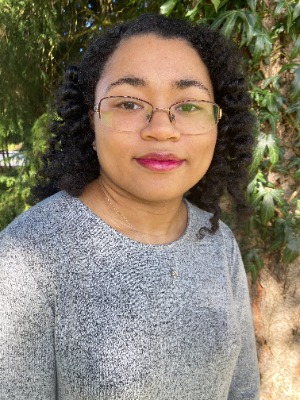Spring 2021 English Capstones
[ Seminar in Fiction Writing | Seminar in Literature | Seminar in Poetry ]
Engl 429: Capstone Seminar in Fiction Writing, Dr. Jason Skipper
Thursday, May 20 | 4:00-7:15pm
4:00-4:35pm
Capstone Title: “Leaving it Open”
4:40-5:15pm
Capstone Title: “She Loves Me”
5:20-5:55pm
Capstone Title: “Hearts for Sale”
6:00-6:35pm
Capstone Title: “The Dragon and the Hummingbird”
6:40-7:15pm
Capstone Title: “Dog Gone”
Friday, May 21 | 12:00-3:05pm
12:00-12:35pm
Capstone Title: “Hundred Year Later Sun”
12:40-1:15pm
Capstone Title: “Cat Lady”
1:20-1:55pm
Capstone Title: “Zachik”
2:00-2:35pm
Capstone Title: “Wild Lily”
2:40-3:05pm
Capstone Title: “Support Needed”
Engl 452 : Seminar in Literature, (Re)Interpreting Jane Austen, 1813-2021, Dr. Adela Ramos

Wednesday, May 19 | 4:00-6:30pm
4:00-4:30pm
Capstone Title:
“The greatest civility”: Politeness, Manners, and Human Worth in Jane Austen’s Pride and Prejudice

Abstract: Jane Austen’s novel, Pride and Prejudice, demonstrates that a person’s manners and amiability were not determined from their birth or rank in society, but through the ways in which they act or conduct themselves toward others. My analysis of the novel’s free indirect discourse alongside the speech and behaviors of the upper class characters, Fitzwilliam Darcy, and Lady Catherine de Bourgh, and the aspirational, William Collins, in comparison to their social inferiors, show how their sense of pride, obsession with social distinctions, and belief of superiority satirize the 19th century’s belief of how propriety and civility should be displayed. By situating the novel in the context of early nineteenth-century ideas about manners, I show how Jane Austen’s use of free indirect discourse is at the service of her critique of the upper class.
4:30-5:00pm
Capstone Title:
“The Distance is Nothing”: Socio-Economic Movement in Pride and Prejudice

Abstract: This project develops a reading of spatial representation in Jane Austen’s Pride and Prejudice to reveal how Elizabeth Bennet’s movement effectively bridges socio-economic differences. In nineteenth-century Britain, single women of Elizabeth’s class were not encouraged to travel alone or without reason, and had to travel by invitation and accompanied. While Pride and Prejudice reflects this, it also reflects how women like Elizabeth Bennet use their own movement to defy normative behavior. Elizabeth symbolically moves through socio-economic spaces of exclusion, choosing which boundaries she crosses and which she upholds determined by her own values. Spatial theory is significant to my analysis, as I classify important examples of space such as Meryton, Netherfield, Rosings Park, and Pemberley, as different kinds of symbolic frames. In analyzing Pride and Prejudice through this theory, I hope to reveal how irregular female movement through different socio-economic spaces can establish a new set of values regarding what kinds of socio-economic values are positive and authentic versus negative and artificial.
5:00-5:30pm
Capstone Title:
Rational Happiness and Marriage in Jane Austen’s Pride and Prejudice and Mary Wollstonecraft’s A Vindication of the Rights of Woman

Abstract: In Jane Austen’s Pride and Prejudice (1813), the characters Elizabeth Bennet, Lydia Bennet, and Charlotte Lucas represent the idea of rational happiness in marriage for women through their discourse and the narrator’s free indirect discourse. I argue that Elizabeth’s discourse reveals how rational happiness encompasses a balance between rational thinking and feelings. During the nineteenth century, marriage for most women was not a choice but rather a necessity as it was the only way for them to avoid destitution. My analysis shows how the way in which the three characters from the novel marry raises many questions about rational happiness. I situate Austen’s writing in her immediate context, showing how she was influenced by Mary Wollstonecraft’s A Vindication of the Rights of Woman (1792). By analyzing the definition of rational happiness and marriage in Austen’s Pride and Prejudice and Wollstonecraft’s A Vindication of the Rights of Woman, I reveal how their writing challenged the way marriage for women was viewed through the concept of rational happiness during the nineteenth century.
5:30-6:00pm
Capstone Title:
Pride and Privilege: The Relationship Between Privilege and Happiness in Pride and Prejudice and Ibi Zoboi’s Pride

Abstract: Though typically remembered for the romance between Elizabeth Bennet and Mr. Darcy, Jane Austen’s 1813 opus Pride and Prejudice is also a story of inequality, exploring what it means to experience privilege, discrimination, and happiness. Whether through Elizabeth’s insistence on finding a partner she loves and respects, Charlotte Lucas’ desire for financial stability, or Lydia Bennet’s lack of consideration for other people, Austen paints a picture of the gender-, socioeconomic-, and reputation-based discrimination that women found themselves subject to while searching for suitable spouses in 19th century Britain. In contrast, Ibi Zoboi’s 2018 reinterpretation Pride centers on Afro-Latina protagonist Zuri Benitez as she comes of age while trying to make sense of the gentrification happening in her Bushwick neighborhood. Because each character has a different understanding of what constitutes being privileged or happy, their unique positionalities ultimately inform the choices they end up making over the course of their respective novels. Over the course of this critical research project, I will not only make sense of how privilege and happiness are interconnected, but also explore how Zoboi’s incorporation of race in Pride—an element noticeably absent from Pride and Prejudice—adds necessary nuance to the themes of the original text.
6:00-6:30pm
Capstone Title:
A Powerful Voice in a Powerless World: Re-interpreting Mrs. Bennet in Pride and Prejudice

Abstract: With this project, I join a community of feminist narratological thinkers who are interested in investigating how female literary texts are informed by the societal and cultural confines placed on women writers. This essay specifically analyzes how Jane Austen’s Mrs. Bennet was written, and in investigating her discourse as well as the narrator’s depictions, I will uncover her subverted feminist role in Pride and Prejudice. On the surface, Mrs. Bennet appears to be a character who completely represents nineteenth-century societal conventions, for she is a wife and a mother with one goal—to get her daughters married. However, as I will reveal, Mrs. Bennet is a precise example of Susan Sniader Lanser’s authority paradox. According to Lanser, as narrators “strive to create fictions of authority” they “expose fictions of authority.” Looking closely at Mrs. Bennet in comparison to Mr. Bennet and Elizabeth, I will reveal her different yet important role in using her voice to resist patriarchal control in nineteenth-century English society
Thursday, May 20 | 5:30-7:30pm
5:30-6:00pm
Capstone Title:
Pride and Pedagogy: Performativity and Play in the High-School Classroom

Abstract: In this project, I pair Jane Austen’s Pride and Prejudice and the card game Marrying Mr. Darcy to develop a feminist and queer theory reading of the norms of gendered and class systems. By putting into conversation a literary analysis of the novel and an analysis of the card game, I invite student engagement in this conversation particularly for visual and conversational learners in the classroom. This project has the capacity to encourage pedagogical conversations on gender norms and the implications of class and socioeconomics. By providing students with a space to discuss and learn from gender and class norms, I will open up conversations about an education system which often commits erasure of these crucial topics. I aim to illuminate Austen as intentionally provoking these discussions and accentuate the importance of them.
6:00-6:30pm
Capstone Title:
Lydia and Mrs. Bennet: Satire and Subversion in Jane Austen’s Pride and Prejudice

Abstract: Jane Austen’s Pride and Prejudice satirizes the expectations of women surrounding marriage and motherhood in late eighteenth century society by way of the mother-daughter relationship between Mrs. Bennet and Lydia Bennet. In doing so, however, Austen undermines the very women she’s trying to elevate as more than just dutiful domestic females. Mrs. Bennet and Lydia are depicted with inherently negative characteristics early in the novel, remain underdeveloped, and therefore, do not get much recognition in criticism, except to affirm their flaws or to highlight other, more admirable characters. My analysis focuses on Austen’s satirization of Mrs. Bennet’s nervous energy and Lydia’s body, as well as their talkative personalities and obsession with men in uniform to give reason as to why they should not be ignored. I compare them to Mr. Collins, a male satirical character who is deemed funny and worthy of more attention than Mrs. Bennet and Lydia, and compare the Bennet spouses to show how the novel participates in the patriarchal dynamics that it attempts to critique.
6:30-7:00pm
Capstone Title:
Dutiful Daughters: Elizabeth and Lydia Find the Line between Duties and Norms in Pride and Prejudice and Unmarriageable

Abstract: The novels Pride and Prejudice by Jane Austen and Unmarriageable by Soniah Kamal address female duties through characters living in restrictive marital structures and how they work to fight against societal norms to protect and gain their agency. Soniah Kamal’s Lady and Alys Binat are retellings of Lydia and Elizabeth Bennett that show us how Austen’s concerns in the 19th century are still alive and well in 21st-century Pakistani American culture. I examine the behavior of Lady and Alys around proposals and fulfilling their societal and familial duties through marriage in Unmarriageable, and how Lydia and Elizabeth try to untangle what it means to participate in society’s expectations and the values assigned to them. I argue that both novels reveal how society views and rewards women who reject societal values both negatively and positively.
7:00-7:30pm
Capstone Title:
Library Talk: Teaching the Uses of Reading in Pride and Prejudice to Young Consumers of Digital Media

Abstract: My pedagogy project bridges nineteenth-century gendered reading practices and twenty-first century consumption of digital media. The importance of my research is for students to understand the meanings behind what I term “Library Talk,” or the discussions of reading practices in Pride and Prejudice. To do so, I invite students to connect the novel to how their engagement with reading on all platforms affects the way they interact with the world around them through a three-day lesson plan and writing assignment. Pride and Prejudice depicts characters through their engagement with books, showing how the consumption of books is conceived as a marker of status in nineteenth-century society. My analysis shows how conversations about books also serve as a means to criticize the androcentric society that Elizabeth navigates. As I expand on what kind of readers there are in the novel—“By the book”, “Methodical” and “Between the lines”–I develop a lesson for students to reflect on the kind of media consumer that they are—“Click baiter,” “Web surfer,” or “Critical thinker.” My project aims to help students identify as different readers and consumers in order to evaluate their position in society in comparison to the readers and consumers seen in Jane Austen’s Pride and Prejudice. The learning outcome of this lesson is for students to look at readers in history in order to become more responsible consumers of current media.



Social Media